How a double murder brought Alex Murdaugh’s dynasty tumbling down

- Oops!Something went wrong.Please try again later.
Monday 23 January 2023 – almost 600 days after Maggie Murdaugh and her 22-year-old son Paul were shot dead in the grounds of their sprawling South Carolina estate – a smiling Alex Murdaugh was led into the Colleton County Courthouse in Walterboro to stand trial for the murders of his wife and son.
Dressed in a starched white shirt and navy blazer, his greying hair perfectly groomed, he looked every inch the successful lawyer he had once been. A portrait of his grandfather, a celebrated local lawyer, that had adorned the courtroom wall for decades, had been removed on the orders of Judge Clifton Newman. One can only speculate what the late Randolph ‘Buster’ Murdaugh Jr would have said about Alex’s fall from grace.
Several hundred journalists had descended on Walterboro, a small city with a population of barely 5,000, and a media overflow room had been set up in the nearby wildlife centre. With few restaurants in the area, food trucks had parked in the town square, alongside half a dozen portable toilets. To capitalise on the murder trial, the local shabby two-star inn
had raised its rates to $374 a night. The defence team, meanwhile, had taken over the luxurious 500-acre Eden at Gracefield wedding venue, which usually costs $20,475 a week.
Court TV would broadcast the trial live. Day after day, the community and indeed much of America tuned in to see the unravelling of the patriarch of one of South Carolina’s most powerful families. It would capture global interest too, as the subject of a Netflix documentary series.
Then, on the morning of 23 February, there was a collective gasp in the courtroom as the defendant confidently strolled up to the witness stand, apparently against his team’s advice.

Maggie and Paul had been shot dead near the dog kennels in the grounds of their hunting lodge, and until then Alex had told police officers that he had not visited the kennels that day, prior to finding their bodies. Now though, on the stand, he admitted lying to law enforcement about being at the kennels before the murders, blaming his opioid-induced paranoia. ‘Oh, what a tangled web we weave,’ he tearfully explained, quoting Sir Walter Scott. ‘Once I told a lie – then I told my family – I had to keep lying.’
He told the jury that he had become addicted to oxycodone, a painkiller, after knee surgery 20 years earlier, stealing millions from his clients and family law firm, which specialised in personal injury cases, to feed his addiction. He claimed he spent up to $60,000 a week on pills. ‘Opiates gave me energy,’ he explained.
Then, in a new version of the events of that fateful night, Alex said that after dinner Maggie had wanted him to go to the kennels with her and Paul. He had initially refused as he was freshly showered and it was hot outside. But he changed his mind and went briefly before returning to the house for a nap, then going to visit his mother, who has late-stage dementia.
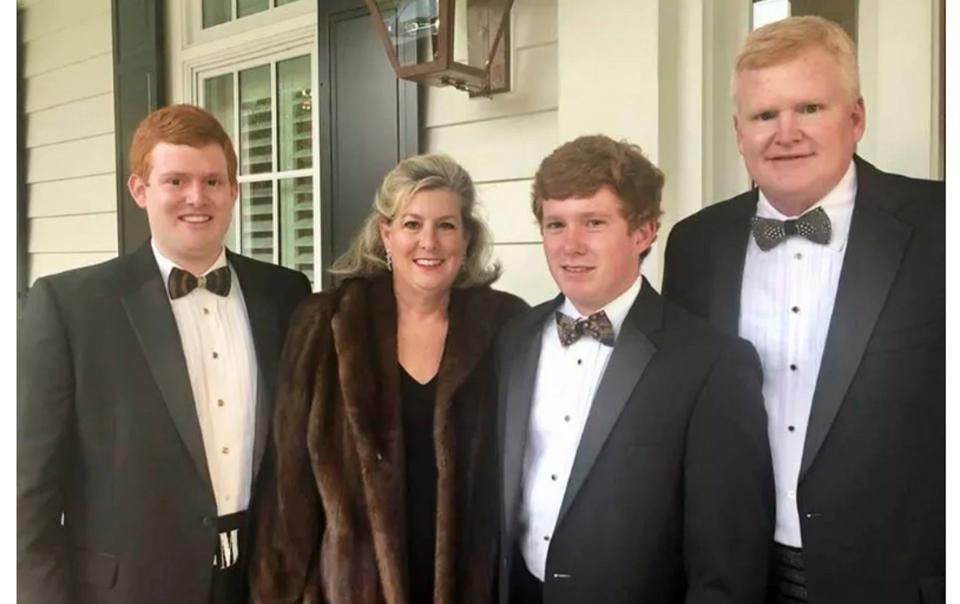
Arriving back at around 10pm, he said he thought it strange that Maggie and Paul weren’t there, so he went back to the kennels to look for them. ‘I saw what y’all have seen pictures of,’ he told his defence attorney.
‘My boy’s lying face down,’ he sobbed. ‘I could see his brain laying on the sidewalk.’
In the eviscerating five-hour cross-examination that followed, lead prosecutor Creighton Waters took Alex through the night of the murders using a minute-by-minute timeline. ‘[You] had to make a new story that kind of fit with the facts that [we have heard during this trial] can’t be denied. Isn’t that true, sir?’ he said. ‘No, sir,’ Alex replied.
At the end, Waters looked him in the eye and asked, ‘Mr Murdaugh, are you a family annihilator?’ ‘You mean, did I shoot my wife and son?’ replied the defendant. ‘No.’
Days later, Alex was found guilty of both counts of murder. The jury required just three hours of deliberation. Immediately the defence team asked Judge Newman to declare a mistrial. He refused. ‘The evidence of guilt is overwhelming,’ he said.
However, the story was far from over. Alex Murdaugh has continued to protest his innocence and in September he filed an appeal against his conviction alleging jury tampering at the hands of a court clerk. In October, he inched closer to the possibility of retrial when an appeals court granted him permission to file a motion to overturn the guilty verdicts.
Meanwhile, he was facing an entirely separate legal battle: some 101 charges mostly related to money laundering and fraud. Last month, Murdaugh pleaded guilty to 22 counts, in exchange for an additional 27-year sentence.
But these guilty verdicts reflect something far greater than the fate of one man: for the first time, a member of the Murdaugh family has fallen foul of the law and received in excess of a rap on the knuckles.
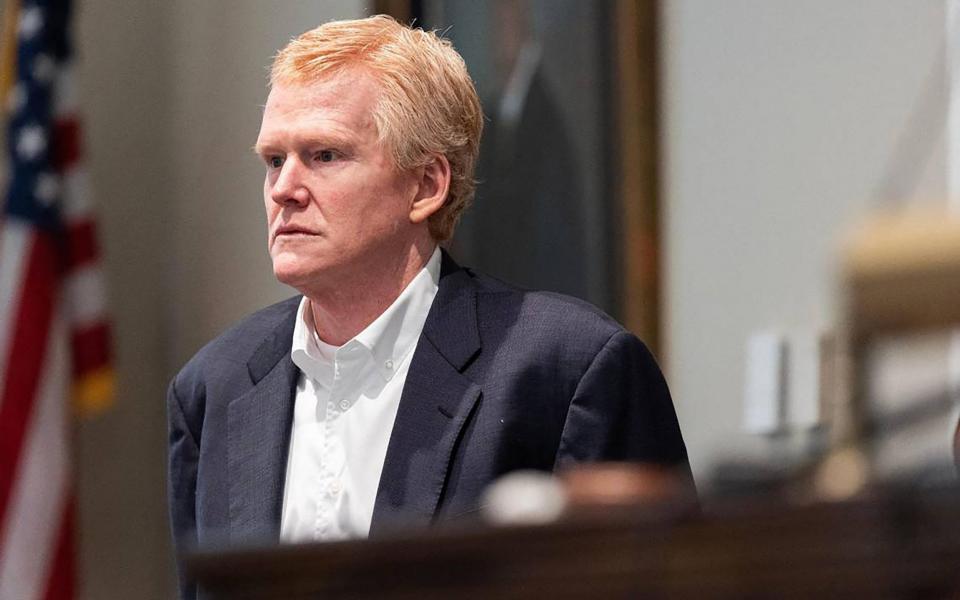
For over a century, the Murdaugh family had dominated swathes of South Carolina’s Lowcountry, epitomising power, justice and big money. One of Alex’s ancestors made his fortune in phosphate mining and fertiliser, before branching out into property and land ownership. ‘They ended up with a lot of land after the Civil War,’ said local historian Sam Crews III. ‘They were good farmers and sharecroppers but they really believed in education. That was a big thing.’
Three generations went on to serve as 14th Judicial Circuit solicitors (called district attorneys in other states), turning it into a family business. Feared and revered, Murdaugh solicitors had sent hundreds of people to prison and well over a dozen to the electric chair. Their powers and influence seemed limitless.
And yet for decades the family deliberately played down their wealth and privilege for political reasons, quietly enjoying their plantation estates, hunting lodges and waterfront properties, including one called Murdaugh Island.
‘The Kennedys of the Lowcountry’
Their supremacy in the Lowcountry began in 1920, when Alex’s great-grandfather Randolph Murdaugh Sr entered the race for the elected 14th Judicial Circuit. He won easily, and a Murdaugh would go on to occupy the solicitor’s chair for the next 86 years.
Randolph Sr became a fixture in local newspapers, which chronicled his many legal victories and charity work. When his first wife Etta died of influenza aged 29, he remarried a local woman, Estelle Marvin; the pair regularly made the society pages, while he relished the high-profile court cases that established him as a statewide figure.
But then tragedy struck, in the strangest of circumstances. On 19 July 1940, Randolph Sr spent the night drinking heavily at a friend’s poker party then set out to drive home. At around 1am, his car came to a stop at a railway crossing. Moments later a freight train crashed into it. The train’s engineer would later testify that by the time he saw Murdaugh’s car it was too late to stop. To his horror, he said, he’d seen the solicitor smile and then wave to the crew seconds before impact.
The elder of his two sons, 35-year-old Randolph II, nicknamed Buster – because he always ‘busted the opponent’ during football games – had already been deputising for his father and swept to victory in the 14th Judicial Circuit solicitor’s election.
By the mid-1940s, Buster was making a name for himself. He wooed jurors with unorthodox courtroom theatrics and magnetic charm, boasting a 95 per cent conviction rate – but apparently cutting legal corners too. ‘You could learn more about prosecuting cases in five minutes from Mr Buster,’ said one solicitor, ‘than you could from years in law school.’
Buster was close friends with almost every judge on the circuit. He threw lavish parties, inviting influential local politicians and members of law enforcement – a close-knit club whose members looked after one another.
One resident in Hampton, where they lived, who wished to remain anonymous, said Buster could look the other way when it came to his friends, despite being otherwise tough on law and order. ‘As a little girl,’ she said, ‘I remember Daddy saying, “Go to Buster Murdaugh, he’ll make it disappear.”’
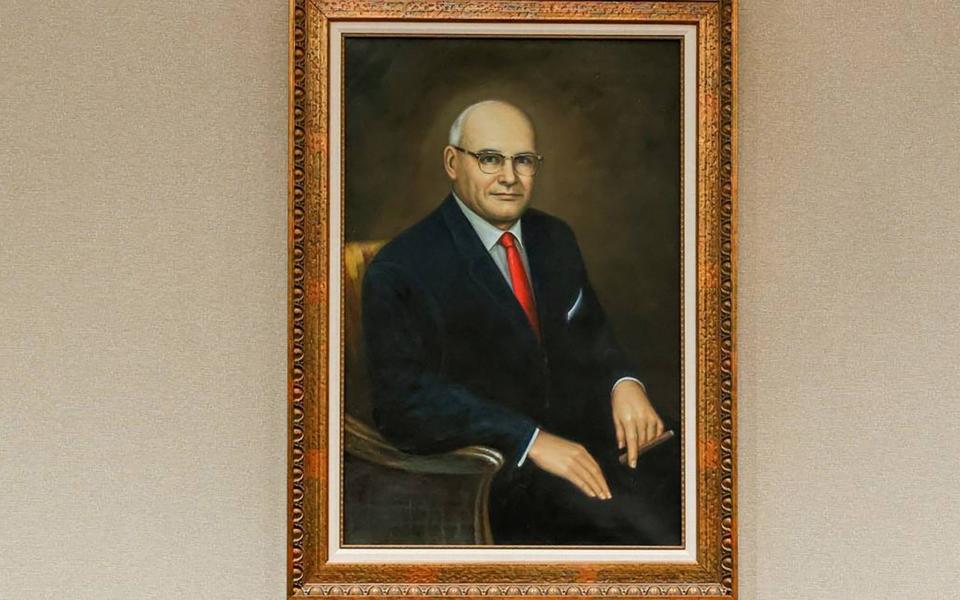
By his middle age, Buster was starting to prepare his own son Randolph III (known as Randy) to take over. Yet by the time the teenage Randy prepared to enter university, his father was facing the biggest crisis of his career: he was indicted by a federal grand jury, accused of taking payoffs from bootleggers.
Buster was forced to resign as 14th Circuit solicitor, and faced a long prison sentence if convicted. But just six months on, he was back as circuit solicitor, as if nothing had happened.
Buster sought to strengthen his grip on his domain – a local historian described the family as ‘the Kennedys of the Lowcountry’. He was charismatic and loved charming people with tales of winning trials and buying jurors.
Still, he could turn when things didn’t go his way – as could his son. On 18 November 1976, Hampton County woke up to an obituary of Randy’s young wife Libby, announcing her sudden death. The next day, the newspaper admitted it had been a hoax and she was ‘alive and well’. Some said it was planted by Libby to punish Randy for having a mistress, while others maintained it was she who was having an affair and Randy had ordered her lover to leave town.
What Alex, the second eldest son, made of this remains unknown; he would have been just eight at the time.
Striking-looking with bright-red hair, Alex (born Richard Alexander) was said to often lead other children into scrapes and always called the shots. But even as a child, he appeared to lack something in his emotional make-up, according to those who knew him. He could charm anyone but seemingly lacked empathy.
In high school, he got a reputation for arrogance. ‘He [had an attitude of], I can do what I want to [because] my daddy’s the solicitor and my granddaddy was, too,’ a former classmate said.
Living the high life
When, in late 1986, Buster announced his retirement and soon after, Randy was sworn in as the third generation of Murdaughs to hold the 14th Circuit solicitor’s position, he hoped that Alex would follow in his footsteps. By then Alex was studying at the University of South Carolina’s School of Law, like his father, grandfather and great-grandfather before him.
But studies soon took second place to Alex’s love of drunken hell-raising. ‘Everybody on campus knew him because he was just cocky and loud,’ said Matt (who didn’t want his surname used). He met Alex in their first year and formed a swift impression of him as ‘a jackass. He thought he was better than everybody else. If you were in his group and he was
buddies with you, then it was all good. But if you weren’t…
‘He would blatantly say, “We can do whatever we want because we won’t get in trouble.”’
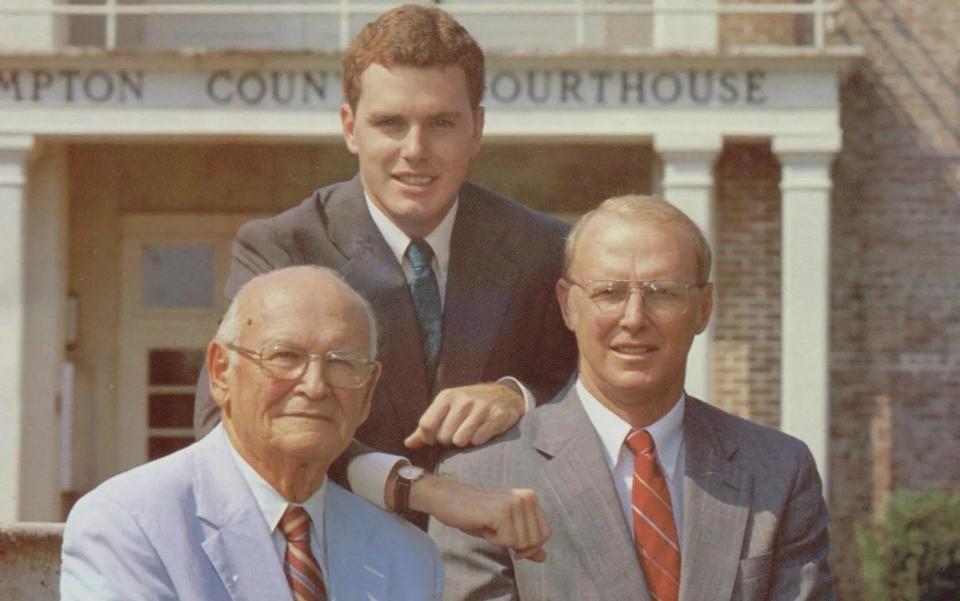
After graduating and marrying Maggie, a young Southern girl apparently swept off her feet by the power of the Murdaugh name, Alex joined PMPED, the family law firm, where he handled personal injury cases as well as criminal ones.
His swelling pay packet meant that he and Maggie were living the good life, buying expensive cars and going on extravagant hunting holidays with their two sons, Buster and Paul. These displays of wealth began to set them apart from the previous generations of Murdaughs, who had always downplayed their financial assets.
‘We didn’t recognise the Murdaughs as being prominent, wealthy people,’ said longtime Hampton resident Kim Brant. ‘They were just like us and didn’t flaunt their wealth. But Alex and Maggie had to have the best of everything and it didn’t go unnoticed.’
There was also much talk locally about young Paul’s behaviour too, according to Brant, ‘He played rough,’ she explained. ‘[He] liked to fight and squabble and Paul often had a knife.’
She also heard disturbing stories from the family’s housekeeper, who has since died, of Paul killing small animals such as frogs, squirrels or lizards. Later, he would reportedly run over dogs with the family Jeep and take their collars as trophies.

His father Alex had his own difficulties: a painkiller addiction and a need to finance it. After years of working on personal injury cases for PMPED, he had devised a scheme to funnel some of the funds into his pocket.
In 2013, it is said that he wrote out a cheque to a distant relative, for just under $10,000 and came to an arrangement for it to be laundered for cash. Over the next eight years, Murdaugh would write a further 457 cheques totalling almost $2.5 million.
All the while he and Maggie lived the high life, chartering private jets and taking extravagant trips – sailing holidays to the Bahamas, duck hunting in Argentina and pheasant hunting in North Dakota.
He and his group of powerful friends from law enforcement, politics and the legal profession often threw ultra-private parties. The following year, a sex worker called Lindsey Edwards was hired to attend a ‘guys’ weekend’. She alleged that Alex, who had appeared charming and polite at first, turned violent after they had gone into a bedroom for sex and attacked her.
‘They threw parties every weekend,’ said Taylor Dobson, a schoolmate of Buster. ‘That was the party spot in Hampton. A lot of fights, alcohol and drugs thrown in there all at the same time.’
The same was true of his younger son’s parties. Paul was already a heavy drinker, even before reaching 21, the legal age to drink in the US, and got into fights. His friends christened his drunken persona ‘Timmy’.
During one spring break, Paul’s friend rented a house as their party HQ. ‘They destroyed the condo and caused $40,000 of damage,’ claims Kim Brant, who knew the owner. When the owner saw all the damage, she threatened to sue, but it is said that Alex Murdaugh and some other fathers quickly settled the matter.
By 2017, Paul, then 18, was dating Morgan Doughty, an attractive blonde schoolmate. He was drinking most days, often using his elder brother’s ID to buy alcohol, and became increasingly violent with Morgan, swearing and spitting at her.
Another incident, if local rumours were to be believed, was the death of the family’s once-beloved housekeeper Gloria Satterfield, who fell on the staircase of the Murdaughs’ home. She suffered a brain bleed and later died.
Alex had initially said it was an accident involving dogs, but later rumours swirled that Paul may have pushed her. Alex also later changed his story, saying that dogs were not involved after all.
All the while, Paul was partying harder than ever. One drunken night on the way back to the Murdaughs’ hunting estate, he crashed his truck. Later, Morgan would tell friends that Paul had been out of control and had almost killed them both.

Another such incident would prove fatal. In February 2019, Paul and Morgan along with four friends took out a boat – Paul was said to be driving it, and under the influence of alcohol, when it slammed into a bridge head and one of the passengers, Mallory Beach, who was 19, died.
The tragedy would shine a light on the Murdaughs that Alex had tried to avoid. Following the accident, the Beach family had filed a lawsuit, and in mid-October, two weeks after mediation to reach a settlement fell through with the Murdaughs, a motion was filed to force Alex to disclose his net worth and provide a detailed breakdown of his finances. It threatened to expose the financial smoke and mirrors he had employed over the years to rob his personal injury clients.
Reporter Mandy Matney of the South Carolina news blog FITSNews covered the story, briefly mentioning how Alex Murdaugh had recently settled a $505,000 wrongful death claim. Her story mentioned a 57-year-old woman who had died after a trip-and-fall incident. Although the story did not name their housekeeper, Gloria Satterfield, it provided a direct link to the court papers that did. It was the smoking gun that would trigger Alex Murdaugh’s downfall.
A dynasty loses its grip
Tony Satterfield, Gloria’s son, read the story; no one had told him or his brother about the settlement. The Satterfield family contacted lawyer after lawyer about taking the case, but as soon as they heard Alex Murdaugh was involved, they wanted nothing to do with it. ‘You don’t cross the Murdaughs,’ one local attorney told a magazine, ‘because they’ll come down on you, hard. And they’ll come on you with all that they’ve got.’
Another hearing had been scheduled in the Mallory Beach case for 10 June 2021, and Alex was under tremendous pressure. With his father in hospital dying of cancer, Alex was at breaking point. Prosecutors believe that this was when he decided to murder his wife and son, so that the hearing would never take place and expose his fraud.
Indeed, after their deaths the Beach hearing was postponed.
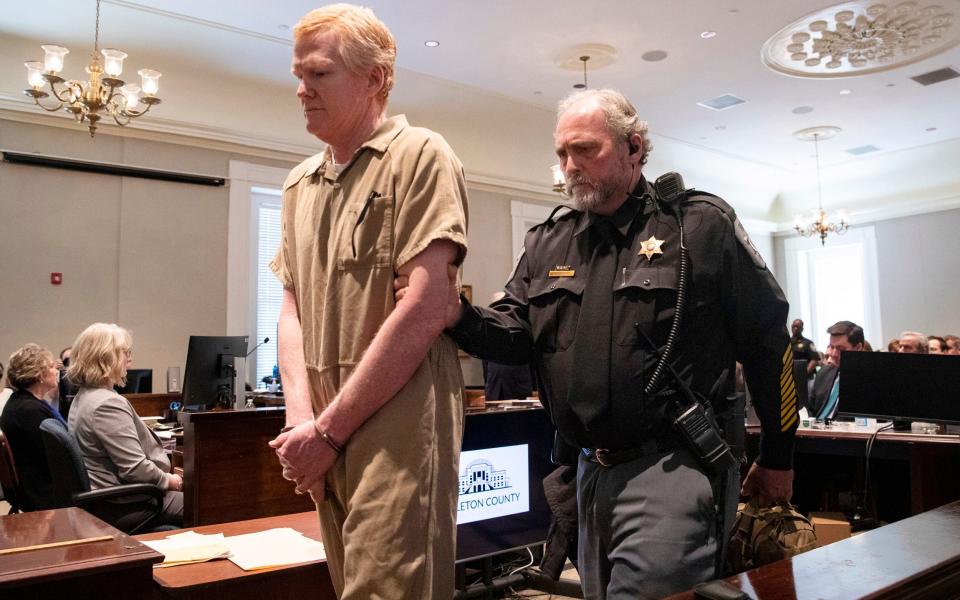
In late July, only a month on from losing his wife and son, Alex was photographed out drinking at various society events with his elder son Buster. Up until the end of August, according to a later indictment, Alex was still stealing money from unsuspecting clients.
But his luck would run out by September when the state opened an investigation into his misappropriation of funds from the family firm – another major turning point in the Murdaugh saga as the family’s century-long hold on South Carolina’s legal system began to slip away.
And then, in July 2022, he was finally charged with the double murder.
During sentencing, the judge told Murdaugh that he would have to wrestle with his conscience for the rest of his life. ‘And I know you have to see Paul and Maggie during the night times when you’re attempting to go to sleep. I’m sure they come and visit you.’
But, as he appeals his conviction and pushes on for a retrial, even that much is unclear.
In May of last year, Alex spent his 54th birthday locked up at the Alvin S Glenn Detention Center – he was yet to be arrested for the murders but was being held due to a host of financial crime charges. Birthdays had always been a big thing in the Murdaugh family and Alex’s only known call that day was to his surviving son Buster, who seemed more distant than ever. Over the last few weeks, they had rarely spoken and when they had Buster always seemed in a hurry to get off the phone.
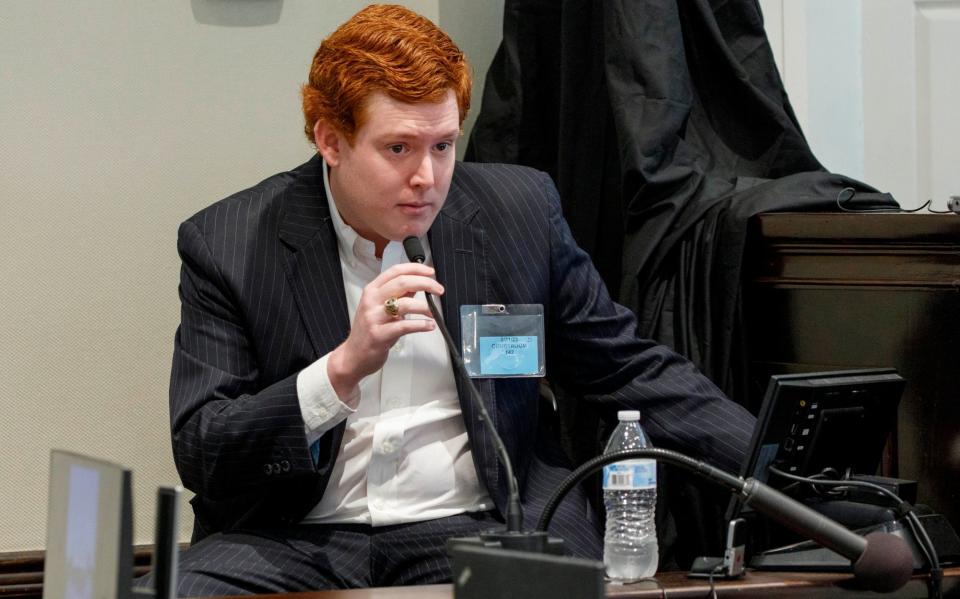
When Buster received the call, he was pulling into a car wash and sounded uncomfortable. After a few minutes of uneasy small talk, Alex struggled to make conversation by asking how his chronic eczema was doing. ‘It’s good,’ replied Buster, sounding taken aback.
‘You know what today is, don’t you?’ Alex finally asked. ‘Yeah,’ replied Buster half-heartedly. ‘Happy birthday.’
‘It ain’t no big deal, I promise you.’ Alex sighed.
‘Will they get you a honey bun with a candle in it?’ asked Buster sarcastically, as his father made an excuse to end the call.
As Alex Murdaugh came to terms with spending the rest of his life behind bars, his uncomfortable birthday conversation with his only surviving son must have haunted him.
The once-powerful Murdaugh dynasty had ruled the Lowcountry for more than 100 years, thriving on the deeply embedded corruption that had gone unchallenged for generations. It would take the labyrinthine Alex Murdaugh case, with its double murders and millions of dollars of fraud, to finally shine a spotlight on all the wrongdoings.
Many locals, who had reluctantly lived with the malaise all their lives, as their parents and their parents’ parents had, are now praying that things in the Lowcountry might change for the better.
Abridged extract from Tangled Vines: Power, Privilege, and the Murdaugh Family Murders, by John Glatt, published in the UK on 4 January (John Blake, £9.99); pre-order at books.telegraph.co.uk — Abridged by Charlotte Lytton

